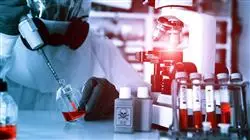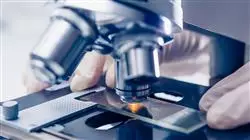University certificate
The world's largest faculty of medicine”
Introduction to the Program
The techniques and procedures of clinical analysis laboratory work compiled in a specialist course of the highest teaching quality”

This module provides students with the necessary skills to perform their work with the utmost excellence as clinical personnel in a laboratory. It addresses the legal framework of a clinical laboratory, where the need for standardization of work and quality control of procedures and files is evident, given the high demand for analytical tests.
The specialty of Clinical Analysis has an eminently multidisciplinary format and this Postgraduate diploma has been created taking this important factor into account. Through this Postgraduate diploma the clinical professional will achieve excellence in the knowledge of instrumental techniques and sample collection techniques, as the basis of analytical methodology. This is one of the fundamental points of their expertise as specialists in the area. Upon completing this course, the professional will have gained an understanding of instrumental techniques and their management, being equipped with specialized skills in order to perform these tasks in the laboratory.
The increasing occurrence of new health problems makes it necessary for professionals to have a deeper understanding of the different pathologies. The specialist knowledge of laboratory personnel is essential for dealing with emerging diseases and, given the degree of student involvement in the course, TECH has adapted to the modern world by offering a new, high-quality online format.
As an additional aspect, Microbiology is the part of science that deals with identifying the microorganisms that cause infections and determining the sensitivity they may present to the various antimicrobial drugs. Infectious pathology involves various medical specialties working together because we encounter infected patients in all specialties. For a correct microbiological diagnosis, it is essential to have good and clear communication between the different professionals of each specialty.
A compendium and deepening of knowledge that will lead you to excellence in your profession”
This Postgraduate diploma in Diagnostic Tests in a Clinical Analysis Laboratory offers you the advantages of a high-level scientific, teaching, and technological course. These are some of its most notable features:
- Latest technology in online teaching software
- Highly visual teaching system, supported by graphic and schematic contents that are easy to assimilate and understand
- Practical cases presented by practising experts
- State-of-the-art interactive video systems
- Teaching supported by telepractice
- Continuous updating and recycling systems
- Self-regulating learning: full compatibility with other occupations
- Practical exercises for self-evaluation and learning verification
- Support groups and educational synergies: questions to the expert, debate and knowledge forums
- Communication with the teacher and individual reflection work
- Content that is accessible from any fixed or portable device with an Internet connection
- Supplementary documentation databases are permanently available, even after the course
Acquire the necessary professional skills with this course in Diagnostic Tests in a Clinical Analysis Laboratory and gain a competitive edge and the best job prospects"
The teachers of this course are professionals currently working in a modern and accredited Clinical Laboratory, with a very solid training base and up to date knowledge in both scientific and purely technical disciplines.
In this way we ensure that we deliver the educational update we are aiming for. A multidisciplinary team of professionals trained and experienced in different environments, who will cover the theoretical knowledge in an efficient way, but, above all, will bring the practical knowledge from their own experience to the course: one of the differential qualities of this course.
This mastery of the subject is complemented by the effectiveness of the methodological design of this Postgraduate diploma in Diagnostic Tests in a Clinical Analysis Laboratory. Developed by a multidisciplinary team of experts, it integrates the latest advances in educational technology. In this way, you will be able to study with a range of easy-to-use and versatile multimedia tools that will give you the necessary skills you need for your specialization.

Our innovative telepractice concept will give you the opportunity to learn through an immersive experience, which will provide you with a faster integration and a much more realistic view of the contents: “learning from an expert”
Why study at TECH?
TECH is the world’s largest online university. With an impressive catalog of more than 14,000 university programs available in 11 languages, it is positioned as a leader in employability, with a 99% job placement rate. In addition, it relies on an enormous faculty of more than 6,000 professors of the highest international renown.

Study at the world's largest online university and guarantee your professional success. The future starts at TECH”
The world’s best online university according to FORBES
The prestigious Forbes magazine, specialized in business and finance, has highlighted TECH as “the world's best online university” This is what they have recently stated in an article in their digital edition in which they echo the success story of this institution, “thanks to the academic offer it provides, the selection of its teaching staff, and an innovative learning method aimed at educating the professionals of the future”
A revolutionary study method, a cutting-edge faculty and a practical focus: the key to TECH's success.
The most complete study plans on the university scene
TECH offers the most complete study plans on the university scene, with syllabuses that cover fundamental concepts and, at the same time, the main scientific advances in their specific scientific areas. In addition, these programs are continuously being updated to guarantee students the academic vanguard and the most in-demand professional skills. In this way, the university's qualifications provide its graduates with a significant advantage to propel their careers to success.
TECH offers the most comprehensive and intensive study plans on the current university scene.
A world-class teaching staff
TECH's teaching staff is made up of more than 6,000 professors with the highest international recognition. Professors, researchers and top executives of multinational companies, including Isaiah Covington, performance coach of the Boston Celtics; Magda Romanska, principal investigator at Harvard MetaLAB; Ignacio Wistumba, chairman of the department of translational molecular pathology at MD Anderson Cancer Center; and D.W. Pine, creative director of TIME magazine, among others.
Internationally renowned experts, specialized in different branches of Health, Technology, Communication and Business, form part of the TECH faculty.
A unique learning method
TECH is the first university to use Relearning in all its programs. It is the best online learning methodology, accredited with international teaching quality certifications, provided by prestigious educational agencies. In addition, this disruptive educational model is complemented with the “Case Method”, thereby setting up a unique online teaching strategy. Innovative teaching resources are also implemented, including detailed videos, infographics and interactive summaries.
TECH combines Relearning and the Case Method in all its university programs to guarantee excellent theoretical and practical learning, studying whenever and wherever you want.
The world's largest online university
TECH is the world’s largest online university. We are the largest educational institution, with the best and widest online educational catalog, one hundred percent online and covering the vast majority of areas of knowledge. We offer a large selection of our own degrees and accredited online undergraduate and postgraduate degrees. In total, more than 14,000 university degrees, in eleven different languages, make us the largest educational largest in the world.
TECH has the world's most extensive catalog of academic and official programs, available in more than 11 languages.
Google Premier Partner
The American technology giant has awarded TECH the Google Google Premier Partner badge. This award, which is only available to 3% of the world's companies, highlights the efficient, flexible and tailored experience that this university provides to students. The recognition as a Google Premier Partner not only accredits the maximum rigor, performance and investment in TECH's digital infrastructures, but also places this university as one of the world's leading technology companies.
Google has positioned TECH in the top 3% of the world's most important technology companies by awarding it its Google Premier Partner badge.
The official online university of the NBA
TECH is the official online university of the NBA. Thanks to our agreement with the biggest league in basketball, we offer our students exclusive university programs, as well as a wide variety of educational resources focused on the business of the league and other areas of the sports industry. Each program is made up of a uniquely designed syllabus and features exceptional guest hosts: professionals with a distinguished sports background who will offer their expertise on the most relevant topics.
TECH has been selected by the NBA, the world's top basketball league, as its official online university.
The top-rated university by its students
Students have positioned TECH as the world's top-rated university on the main review websites, with a highest rating of 4.9 out of 5, obtained from more than 1,000 reviews. These results consolidate TECH as the benchmark university institution at an international level, reflecting the excellence and positive impact of its educational model.” reflecting the excellence and positive impact of its educational model.”
TECH is the world’s top-rated university by its students.
Leaders in employability
TECH has managed to become the leading university in employability. 99% of its students obtain jobs in the academic field they have studied, within one year of completing any of the university's programs. A similar number achieve immediate career enhancement. All this thanks to a study methodology that bases its effectiveness on the acquisition of practical skills, which are absolutely necessary for professional development.
99% of TECH graduates find a job within a year of completing their studies.
Postgraduate Diploma in Diagnostic Tests in a Clinical Analysis Laboratory
The correct treatment of a pathology is intrinsically dependent on a primary diagnosis free of errors. Such an assessment requires specific tests depending on the case in question; from hematological, urological, genomic, among many others, to detailed microbiological and biochemical analyses. The full medical development revolves around the most accurate inquisitive science. At TECH we want to train new scientific minds that contribute to an improvement in health processes, and therefore we present the Postgraduate Diploma in Diagnostic Tests in a Clinical Analysis Laboratory: a postgraduate course divided into four approaches: the first, concerning the parameters of standardization, regulations and legal framework that encompasses the operation of a clinical laboratory; the second, dedicated to instrumental techniques; the third, delving into biochemistry and genetics; and the fourth, addressing everything related to microbiology and parasitology. Nowhere else will you find such a complete program, taught in a short time and with the ease of access that prioritizes our virtual methodology.
Dare to become an expert in clinical laboratories
Can an oncologist proceed with complete confidence to treat a neoplasm if there is a parameter that was not taken into account at the time of cytometry? Is it advisable to prescribe drugs to a patient with a suspected viral pathology if the initial analyses with the PCR method were not 100% reliable? The answer for both cases is obviously no. Hence how crucial it is for medical quality to be trained in a field such as diagnostic tests in laboratory settings. The program we offer you brings together the most essential knowledge to perform an ideal job in such fields. Do you want to learn cell culture techniques, become proficient in gravimetry or gain a deeper understanding of virological taxonomy? This is your opportunity. At TECH Global University we open the doors to a whole compendium of practical knowledge so that you can add competencies to your career and expand into different areas of the labor sector. Learning more in less time and in a totally new way is possible thanks to our educational model. Dare to become a sophisticated medical-scientific expert.







